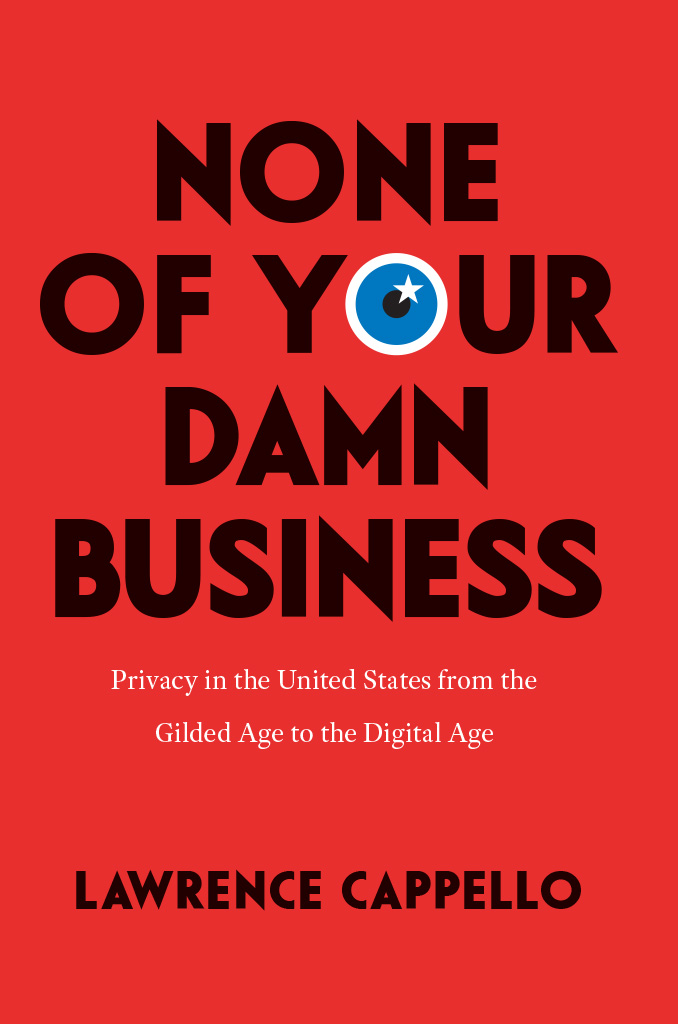
NONE OF YOUR DAMN BUSINESS
NONE OF YOUR DAMN BUSINESS
Privacy in the United States from the Gilded Age to the Digital Age
LAWRENCE CAPPELLO
The University of Chicago Press
Chicago and London
The University of Chicago Press, Chicago 60637
The University of Chicago Press, Ltd., London
2019 by Lawrence Cappello
All rights reserved. No part of this book may be used or reproduced in any manner whatsoever without written permission, except in the case of brief quotations in critical articles and reviews. For more information, contact the University of Chicago Press, 1427 E. 60th St., Chicago, IL 60637.
Published 2019
Printed in the United States of America
28 27 26 25 24 23 22 21 20 19 1 2 3 4 5
ISBN-13: 978-0-226-55774-8 (cloth)
ISBN-13: 978-0-226-55788-5 (e-book)
DOI: https://doi.org/10.7208/chicago/9780226557885.001.0001
Library of Congress Cataloging-in-Publication Data
Names: Cappello, Lawrence, author.
Title: None of your damn business : privacy in the United States from the gilded age to the digital age / Lawrence Cappello.
Description: Chicago : The University of Chicago Press, 2019. | Includes bibliographical references and index.
Identifiers: LCCN 2019005346 | ISBN 9780226557748 (cloth : alk. paper) | ISBN 9780226557885 (e-book)
Subjects: LCSH: PrivacyUnited StatesHistory. | National securitySocial aspectsUnited States.
Classification: LCC BF637.P74 C36 2019 | DDC 323.44/8dc23
LC record available at https://lccn.loc.gov/2019005346
 This paper meets the requirements of ANSI / NISO Z39.48-1992 (Permanence of Paper).
This paper meets the requirements of ANSI / NISO Z39.48-1992 (Permanence of Paper).
For Carol and Ethel Campbell who taught their children to respect other peoples privacy, and without whom, nothing.
CONTENTS
Capitol Hill, early afternoon, Tuesday, April 10, 2018. Having set aside his signature dark grey T-shirt and jeans for a smartly fitted navy blue suit and tie, Mark Zuckerberg, the thirty-three year old chief executive of Facebook and bona fide American wunderkind, walked into the Senate Chamber to face the first of two marathon public hearings where he would endure ten hours of questioning from ninety-one lawmakers on the subject of privacy.
He looked confident, all things considered. Taking time for a few polite handshakes as he made his way toward the witness table where a large group of press photographers were patiently waiting for him. About thirty-five in total. Cameras at the readytightly packed in efficient rows and assembled in such a way that their positioning had essentially transformed them into a single wall of lenses. When Mr. Zuckerberg reached the table, the wall started shooting. And for two painfully awkward minutes the only sound in the room was the sustained rapid-fire clicking and shuttering of professional-grade digital cameras. When Zuckerberg finally sat down the wall closed in around him, abandoning any previous regard it had for his personal space as it fired from all angles. Later, during a routine break, one photographer from the Associated Press considered it fair play to take photos of, and then post on the internet, two pages from Zuckerbergs private notes that had been accidentally left on the witness table. The irony was not lost on the millions of Americans watching from home.
The chamber is called to order. Mr. Zuckerberg, in many ways you and the company that you created, the story that youve created represents the American Dream, opened Senator John Thune, chairman of the Commerce Committee. Many are incredibly inspired by what youve done. At the same time, you have an obligation, and its up to you, to ensure that that dream does not become a privacy nightmare for the scores of people who use Facebook.
The purpose of the inquiry was widely known. A month prior, a whistle-blower named Christopher Wylie announced to the press that a British political consulting firm called Cambridge Analytica had improperly accessed social media data on more than fifty million Americans with the intention of influencing the 2016 presidential election. A few weeks later Facebook admitted that the actual number was probably closer to eighty-seven million. The recent hacking of the Equifax credit bureau, which had affected about half of the nations adult population, was still fresh in peoples minds, as was the knowledge that the European Union was scheduled to implement a drastic and sweeping new privacy law the following month. But the hearings were about more than just the inability of an American company to protect sensitive information. Facebooks lax privacy standards, it seemed, may well have bled into the fabric of our democratic system.
This is not a book about the Cambridge Analytica scandal. But watching Congress try to make sense of it over those two days it soon became abundantly clear that in these early decades of the internet age the protection of personal privacy has become one of the foremost concerns facing the United States. That our current social and political struggles over privacy have both the urgency and resonance capable of defining an era.
It was also clear that as a social and political issue, privacy is incredibly difficult to understand. Almost every lawmaker present agreed that Americans had a reasonable expectation of privacy that was worth protecting. But when it came time to engage the precise privacy problems at play, few of them were able to articulate
So how did we get here? Thats what this book is about. If we want a sense of what privacy is and why it matters, there is a lot to be gained by looking at it historically.
This book examines five key privacy debates in US history from the Gilded Age to the internet age with the aim of providing some much-needed clarity about that very complicated wordprivacy. Each chapter focuses on the interplay between privacy and one particular force that pushed against it in the name of the public intereston a specific context in which privacy first became threatened, then defended, then ultimately circumscribed in the face of that threat. And because historians have the privilege of hindsight, every chapter offers a more comprehensive analysis of the privacy problems at play in each historical moment than privacy advocates themselves were able to at the time.
At first glance the popular narrative shared by most Americans is very much in line with what Senator Nelson was trying to say. This narrative holds that technology is to blamethat after computers burst onto the scene in the 1950s technology kept evolving, which made our lives easier and more efficient, and so Americans willingly traded a little privacy for a little convenience and more national security until we all woke up one morning and realized things had perhaps gone too far. By then it was far too difficult to roll things back. We had become too dependent. Worse, we had become too complacent. And now privacy is circling the drain. QED.
But the real story of American privacy is considerably more nuanced. The origins of our modern debates about privacy date back to the late nineteenth centuryinspired in part, yes, by new technologies that many found unsettling, but also very much by changing standards of public decency and the reality that information was being democratized. From therefrom the Gilded Agethe American conversation about privacy branched out in a variety of directions across an array of contexts throughout the twentieth century. Because privacy is such a multifaceted concept, this was not one conversation but many, occurring simultaneously on multiple overlapping fronts and grappling with such important questions as the proper role of the media, government intrusions on civil liberties, the rise of the welfare state, the wars on poverty and crime, new understandings of gender and the body, and, as was the case with Facebook, commercialized data collection.
Next page
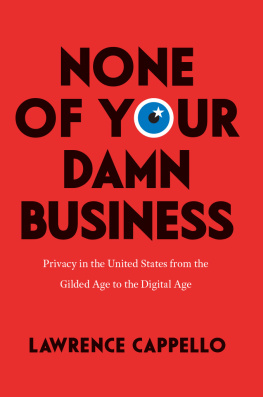
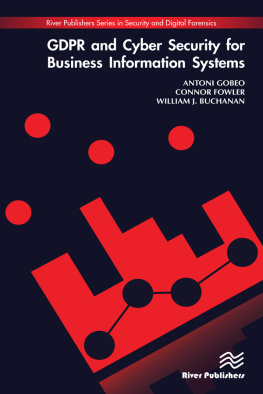
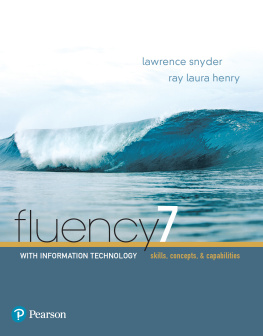
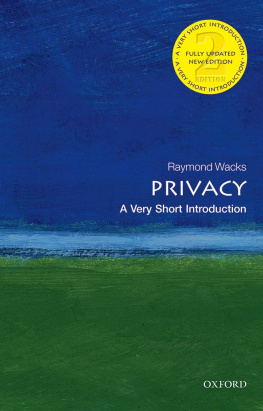

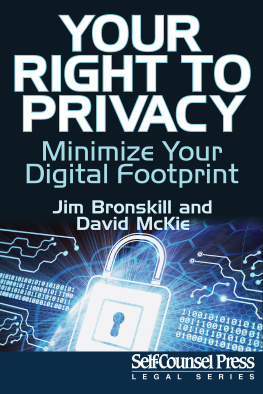
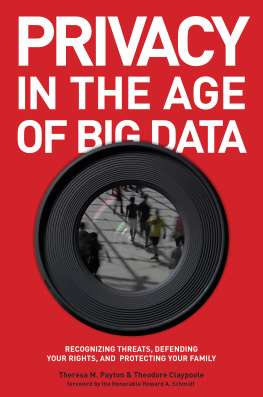


 This paper meets the requirements of ANSI / NISO Z39.48-1992 (Permanence of Paper).
This paper meets the requirements of ANSI / NISO Z39.48-1992 (Permanence of Paper).